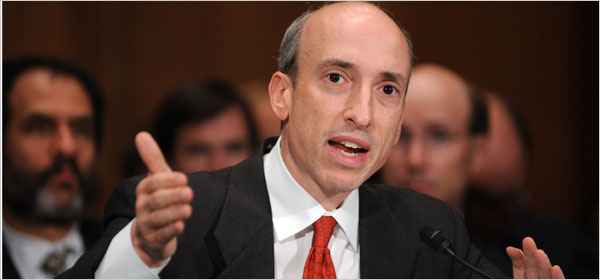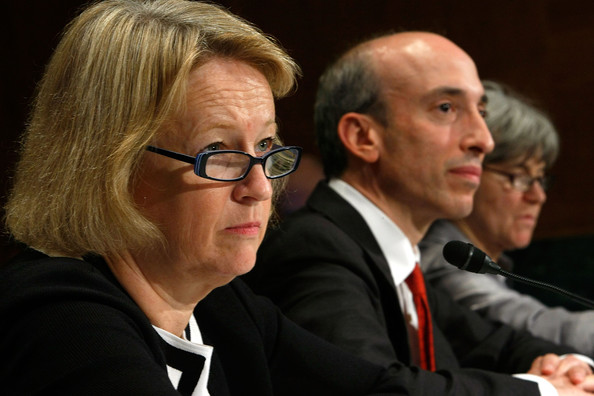A Secretive Banking Elite Rules Trading in Derivatives

Scroll down for VIDEO...
---
By Louise Story
On the third Wednesday of every month, the nine members of an elite Wall Street society gather in Midtown Manhattan.
The men share a common goal: to protect the interests of big banks in the vast market for derivatives, one of the most profitable — and controversial — fields in finance. They also share a common secret: The details of their meetings, even their identities, have been strictly confidential.
Drawn from giants like JPMorgan Chase, Goldman Sachs and Morgan Stanley, the bankers form a powerful committee that helps oversee trading in derivatives, instruments which, like insurance, are used to hedge risk.
In theory, this group exists to safeguard the integrity of the multitrillion-dollar market. In practice, it also defends the dominance of the big banks.
The banks in this group, which is affiliated with a new derivatives clearinghouse, have fought to block other banks from entering the market, and they are also trying to thwart efforts to make full information on prices and fees freely available.
The marketplace as it functions now “adds up to higher costs to all Americans,” said Gary Gensler, the chairman of the Commodity Futures Trading Commission, which regulates most derivatives. More oversight of the banks in this market is needed, he said.
But big banks influence the rules governing derivatives through a variety of industry groups. The banks’ latest point of influence are clearinghouses like ICE Trust, which holds the monthly meetings with the nine bankers in New York.
Under the Dodd-Frank financial overhaul, many derivatives will be traded via such clearinghouses. Mr. Gensler wants to lessen banks’ control over these new institutions. But Republican lawmakers, many of whom received large campaign contributions from bankers who want to influence how the derivatives rules are written, say they plan to push back against much of the coming reform. On Thursday, the commission canceled a vote over a proposal to make prices more transparent, raising speculation that Mr. Gensler did not have enough support from his fellow commissioners.
The Department of Justice is looking into derivatives, too. The department’s antitrust unit is actively investigating “the possibility of anticompetitive practices in the credit derivatives clearing, trading and information services industries,” according to a department spokeswoman.
Indeed, the derivatives market today reminds some experts of the Nasdaq stock market in the 1990s. Back then, the Justice Department discovered that Nasdaq market makers were secretly colluding to protect their own profits. Following that scandal, reforms and electronic trading systems cut Nasdaq stock trading costs to 1/20th of their former level — an enormous savings for investors.
“When you limit participation in the governance of an entity to a few like-minded institutions or individuals who have an interest in keeping competitors out, you have the potential for bad things to happen. It’s antitrust 101,” said Robert E. Litan, who helped oversee the Justice Department’s Nasdaq investigation as deputy assistant attorney general and is now a fellow at the Kauffman Foundation. “The history of derivatives trading is it has grown up as a very concentrated industry, and old habits are hard to break.”
Representatives from the nine banks that dominate the market declined to comment on the Department of Justice investigation.
Continue reading at the NYT...
##
Gensler protects the banks...
Video - CFTC Chairman Gary Gensler on derivatives reform with Bloomberg
---
From the DB archives...
« Maria Cantwell Flips On Finreg, Announces Intent To Vote 'Yes', Gensler Letter Leads To Switch »
http://dailybail.com/home/maria-cantwell-flips-on-finreg-announces-intent-to-vote-yes.html


 Dec 12, 2010 at 8:10 PM
Dec 12, 2010 at 8:10 PM
Reader Comments (11)
source for story...
helpful graphic...
http://dailybail.com/headlines/former-goldman-exec-gensler-now-advocates-for-reform-of-deri.html
http://dailybail.com/home/maria-cantwell-flips-on-finreg-announces-intent-to-vote-yes.html
CATO Institute 1994.
http://www.cato.org/pubs/regulation/regv17n4/reg17n4b.html
Lots of good historical information.... Here is the conclusion.
[SNIP]
Conclusion
Despite claims by naysayers, markets are a powerful regulator of economic activity. In the absence of a government mandate or even an explicit self-regulatory organization, derivatives participants have behaved in a responsible fashion to address the inherent risks of derivatives transactions and the need for improvements in risk management procedures and practices as well as improved accounting and disclosure.
Regulation is not driven by market forces. It is a blunt instrument which rarely achieves that proper balance between prudence and flexibility that fosters innovation and competitiveness. Instead, by placing a straightjacket on firms, regulation restricts innovation and shifts valuable resources away from market-driven risk management toward regulatory compliance and, indeed, regulatory avoidance.
Political histrionics are no substitute for sound economic analysis. As shown above, the risks of derivatives are not new and are not unique to those instruments. Thus, derivatives do not merit separate regulation. To date, no empirical support has been offered for the notion that current regulation, with incremental improvements and enhanced coordination, is inadequate to address the risks of derivatives. The stakes are high and the costs of overregulation are large. Derivatives activity in the U.S. is not isolated from global capital markets. Excessive and hasty regulation will accomplish little more than driving this vital and dynamic domestic business overseas.
this section almost made me puke...
"In the absence of a government mandate or even an explicit self-regulatory organization, derivatives participants have behaved in a responsible fashion to address the inherent risks of derivatives transactions and the need for improvements in risk management procedures and practices as well as improved accounting and disclosure."
The exclusive power, or privilege of selling a commodity; the exclusive power, right, or privilege of dealing in some article, or of trading in some market; sole command of the traffic in anything, however obtained; as, the proprietor of a patented article is given a monopoly of its sale for a limited time; chartered trading companies have sometimes had a monopoly of trade with remote regions; a combination of traders may get a monopoly of a particular product.
Great material here.
http://129.3.20.41/eps/fin/papers/0307/0307003.pdf
Accounting for Derivatives in Emerging Market Economies. 2008.
http://www.yurilok.com/uploads/Guay__Kothari____Loktionov__2008_.
http://www.reuters.com/article/2011/06/24/us-financial-deutsche-whistleblower-idUSTRE75N0VK20110624
[snip]
In the fall of 2009, Deutsche Bank quietly fired one of its top derivative traders in London after a colleague in New York complained about finding "substantial trading anomalies" in a multibillion dollar portfolio of high-risk credit default swaps managed by the German-based bank, Reuters has learned.